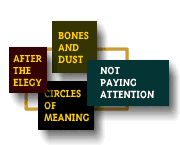
free vs. free
A lapse of attention must explain the opening of David Golumbia's Hypercapital, a paper that appeared in the refereed journal, Postmodern Culture (issue 7.1, September 1996). Golumbia begins with a subtle historical anachronomism that escaped not only his attention but also the attention of all the journal's referees:
| "Some of liberal democracy's deepest convictions rest on assumptions about free (or nearly free) and complete access to information. These assumptions, tied to our dreams about liberal American democracy at least since the passage of the Bill of Rights, go something like this: ....the wider, cheaper, and more comprehensive the popular access to information the better." |
|
Many of the American revolutionaries wanted information (as well as other
goods) to be widely available at modest cost. Support for postal service,
for postal subsidy of journals, for libraries, and related movements may,
I think, better be viewed as part of a general desire for cultivation of
the economy and the common good rather than a specific intent to separate
information and capital.
|
Accidents and errors like this are easily made and easily remedied. The author, editor, and the referees seem all to have overlooked the very first sentence of the paper, or perhaps failed to notice how its loss unhinges the paper's political argument from its historical premises.